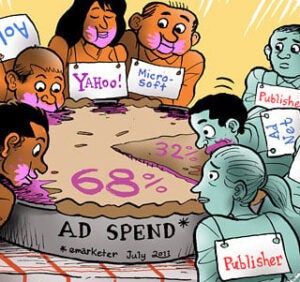 Private ad tech companies are going public, public ad tech companies are coming off the market, private equity is getting acquisitive – and it’s all part of the natural order and an overdue market correction.
Private ad tech companies are going public, public ad tech companies are coming off the market, private equity is getting acquisitive – and it’s all part of the natural order and an overdue market correction.
Time to put a fork in the now timeworn “ad tech is dead” narrative.
“We’ve always been bullish on this space and I find it bizarre that some public investors or even venture capitalists have negative sentiment or avoid this sector,” said LUMA Partners CEO and founder Terence Kawaja. “It’s true the space is highly fragmented, but you just have to pick your spots. And if you do, there’s a ton of opportunity.”
Investors and VC firms could be forgiven for being down, however – because so are most of the ad tech stocks themselves. Although some have fared better than others, Rocket Fuel, Rubicon, Tremor, TubeMogul, Marin Software and YuMe have all seen their prices dip since hitting the public market.
That doesn’t mean these companies don’t have valuable assets and, at least in some cases, a viable business model, but investors were assured that there would be a combination of growth and profitability. And when both weren’t delivered within an acceptable timeline, the market reacted accordingly.
“These companies promised a bunch of things they didn’t deliver and when that happens, they end up getting discounted by the market perhaps more than they deserve,” said Divyank Turakhia, who sold the contextual ad network he founded, Media.net, to a Chinese consortium for $900 million in August.
“That sucks for companies that have done well, like Criteo, which have always delivered. A company like Criteo has captured a lot of value, it’s true, but maybe they didn’t get as much as they would have if it hadn’t been for other companies in the space.”
But there’s a new story to tell with a new cast of characters or, in some cases, the same players wearing different costumes.
There’s The Trade Desk with its successful initial public offering in August, AppNexus with its IPO likely imminent in Q4, Millennial Media nested under AOL and AOL (and Yahoo) nested under Verizon, Neustar planning to split itself in two and the private equity acquisitions of now formerly public companies Sizmek and Marketo.
“At first blush it might look convoluted, but the changes we’re seeing reflect a maturation of the sector,” Kawaja said. “The Trade Desk IPO serves as a beacon, an example of how it’s possible for companies in this space to be both high-growth and highly profitable.”
That combination appeals to a new set of acquirers, including telcos, private equity, mar tech companies and Chinese conglomerates. They’re not necessarily interested in digital media or ad tech, per se, but they’re all beguiled by the notion of doing more with their data, and that’s fueling a lot of the consolidation
AdExchanger Daily
Get our editors’ roundup delivered to your inbox every weekday.
Daily Roundup
“Now, some of the older, more traditional players are coming into this media and tech world and, obviously, it’s a bit too late to build, so they have to buy,” said Jimmy Maymann, AOL’s EVP of content and consumer brands, speaking at an IAB event during Advertising Week. “Verizon did that, and if Disney or Salesforce wants to be in this space, that is what they will have to do.”
And do it they will.
“We have a six- to 24-month advanced look at what’s coming and we think, well, there’s going to be a lot more activity here,” Kawaja said. “It might be contrary to what the average investor still seems to think, but there are interesting companies in this sector and people will make a lot of money.”
The Trade Desk in particular is giving investors like Leo de Luna, managing director of Microsoft Ventures, the fortitude to invest in a space that didn’t previously inspire him with the greatest of confidence.
“It takes exits like that to get folks like us excited about putting money in,” de Luna said at an xAd event in New York City in late September. “What I’m looking for is a defensible business.”
Defensible as in revenue-positive – or at least a plan to get there. Ad tech has been somewhat challenged in that regard.
One reason for that is the working capital issue.
Clients on the brand and agency side generally pay out 90 or 120 days after the fact, sometimes longer, but operating expenses generally need to be paid on a monthly cycle. A lot of companies in the space carry about two months of revenue on their books as receivables, which can be especially daunting in January since Q4 often represents as much as 50% of their annual revenue.
“In its S-1, The Trade Desk actually does a very good job of laying out the working capital challenge, which has been one of the industry’s dirty little secrets,” said Michael Collins, CEO of Adelphic.
In other words, it’s an IPO starting off on the right foot, which dovetails with an overriding trend in the industry right now around greater transparency.
“The market is looking for more transparent models,” Collins said. “Seeing the market properly reward a programmatic ad tech company is great for the industry. It also gives people something they can point to other than Rubicon or TubeMogul, and that should free up capital all the way across both the public markets and the private sector.”
Even more so if AppNexus files for its IPO in Q4 as expected. Existing investors in the sector are watching like hawks.
“That would provide some strong tailwinds for the broader industry,” said Nima Wedlake, an associate and research lead at Thomvest Ventures, a VC firm with investments in a number of ad tech companies, including Apsalar, DataXu and Vungle. “The success of a company like The Trade Desk or AppNexus if it happens is something that’s very, very important to us.”














